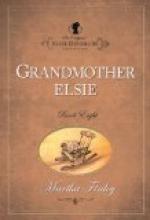“Grounds, man! I’m sure it would seem the most natural thing in the world—each the eldest child of intimate and dear friends—and I have never made any secret of my preference for her——”
“Which amounts to nothing unless it had been reciprocated.”
“Reciprocated! I’ve always thought it was, and delayed speaking out plainly only because I considered myself safe in waiting to grow a little richer.”
“In which you were egregiously mistaken. Now let me assure you once for all, that Elsie never has and never will care for any man in that way but Lester Leland.”
At that Philip turned and walked rapidly away. “I’d rather have lost all I’m worth!” he muttered to himself. “Yes; every cent of it. But as to her never caring for anybody else if that fellow was out o’ the way, I don’t believe it. And he may die; may be dead now. Well, if he is I’ll keep a sharp look-out that nobody else gets ahead of me.”
His self-love and self-conceit had received a pretty deep wound, his eyes were opened to the fact that Elsie avoided being alone with him, never appearing on deck without her brother, and he did not trouble her much during the remainder of the voyage, did not make his intended offer.
CHAPTER V.
“I feel
Of this dull sickness at my heart afraid
And in my eyes the death sparks flash and fade
And something seems to steal
Over my bosom like a frozen hand.”
—Willis.
Dr. Arthur Conly rode briskly up the avenue at Roselands, dismounted, throwing the bridle to a servant, and went up the steps into the veranda, whistling softly to himself.
“You seem in good spirits, Art,” remarked Calhoun, who sat there with the morning paper in his hand. “I haven’t heard you whistle before for—well I should say something like a fortnight.”
“I am in good spirits, Cal, the Ion children are out of danger, and uncle has just had a telegram from Ned announcing the safe arrival of their party in New York in good season to take the steamer.”
“I presume this tells the same story, though I can’t think why it isn’t directed to grandpa, or to me as the eldest son of the house,” Calhoun said, handing an unopened telegram to his brother.
Arthur tore it hastily open, glanced at the contents and paled to the very lips.
“What is it?” cried Calhoun in alarm.
“Mother!” said Arthur huskily, putting the paper into his brother’s outstretched hand. “She has been struck down with apoplexy. Cal, I must take the first train for New York. Look at the paper, see when it leaves. Thank God that those children are out of danger! But I must see whom I can get to take charge of them and my other patients during my absence.”
Then calling to a servant he directed a fresh horse to be saddled and brought to the door with all speed, and hurrying into the house, summoned his old mammy and bade her pack a valise with such clothing as he would need on a journey to the North which might occupy a week or more.




